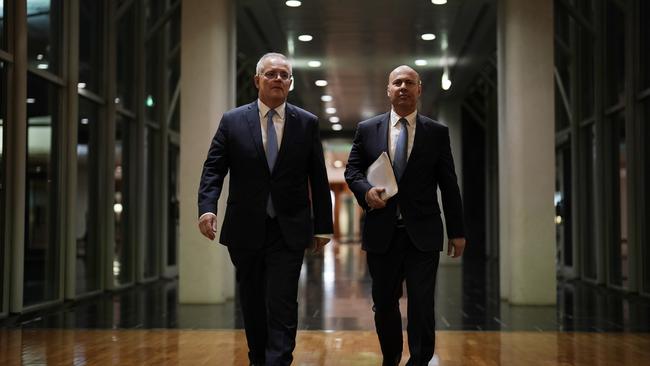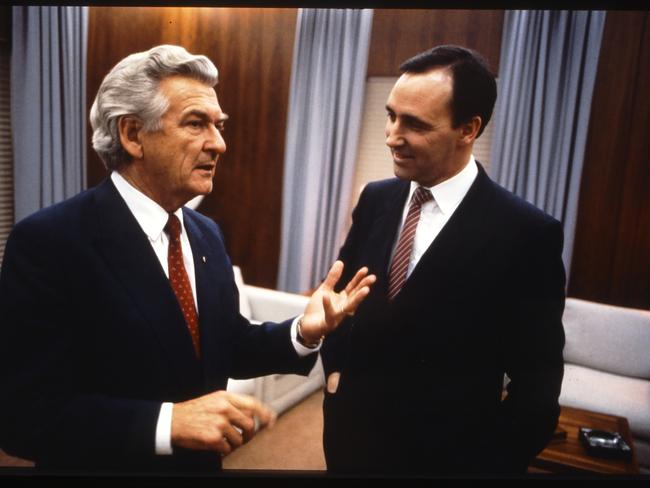Looking for economic vision in this election campaign? Forget it
The notion that the Coalition is superior to Labor as an economic manager is embarrassingly false.

That’s the plan being hatched at the newly established Liberal Party campaign headquarters in Brisbane, and it has long been the way Scott Morrison and Josh Frydenberg have framed their political rhetoric.
There is only one small problem with this approach: it is complete bullshit. That’s right, it is founded on a false premise – which is not to suggest it will be ineffective. The approach may well work, given opinion polls consistently show voters believe the Coalition is the superior economic manager. With so many other issues running against the government and the Prime Minister, this voter (mis)conception is one of the few narratives running its way.
But historically, and certainly in the contemporary context, the notion that the Coalition is superior to Labor as an economic manager is embarrassingly false. It started more than a quarter of a century ago when the Coalition won the 1996 election. Paul Keating’s long and distinguished political career came to a sudden end as Labor was trounced by 94 seats to 49 in the House of Representatives. The Coalition picked up 29 seats with a swing of more than 5 per cent at that election.
What was left of Labor was shattered and bruised. Former finance minister Kim Beazley took over as opposition leader. When new treasurer Peter Costello gained access to the books, he quickly discovered a $9bn deficit, larger than anticipated. These were the days before the charter of budget honesty required governments to lay out the state of the books before polling day.
The new government quickly dubbed it “Beazley’s black hole”, using the budget blowout as a political weapon for years to come.
Labor made the mistake of retreating rather than stepping forward to defend its economic track record in government: the most economic reforming administration in Australian political history.
The micro-economic reforms the Hawke and Keating governments presided over set Australia up for generations of prosperity, without which our global standing today wouldn’t be what it is.

Because John Howard’s government embraced fiscal belt-tightening to reduce debt and further economic reforms including introducing the GST and industrial relations reforms, it took over the mantle of quality economic stewardship.
To be sure, the back half of the Howard government wasn’t as impressive as the start when it came to economic management, but the political narrative that only the Coalition could be trusted to manage the economy became a rhetorical truism.
The apparent divide on this score was easy to continue exploiting after Labor’s 2007 return to power because the onset of the global financial crisis resulted in a brief economic contraction followed by budget deficits and a build-up of government debt as far as the eye could see.
The Coalition in opposition labelled it a “debt and deficit disaster”, a mantra that helped it win 90 seats with a swing of more than 3.5 per cent on its way into government at the 2013 election.
Voters would have had the understandable expectation that the newly minted Coalition government would quickly embark on budget repair and overdue economic reforms to continue the good work of modernising the Australian economy done in the 1980s and ’90s. But because Tony Abbott ruled out doing almost anything proactive in government on the eve of the 2013 election – so concerned about losing – when his first budget did seek to wield the axe he cut off his own political legs.
The white papers into federation and tax reform that Abbott initiated were junked by a desperate Malcolm Turnbull after he brutally seized the prime ministership from the unpopular Abbott.
When Turnbull’s newly installed treasurer, Morrison, sought to pick up the long overdue pieces of GST reform, he was overruled by the boss.
Next to nothing happened and debt continued to grow, wages stagnated, and the dysfunction of the federation and the inefficiencies in the tax system persisted.
Fast forward to today and government debt on the Coalition’s watch has tripled. Private debt also continues to grow. While the pandemic explains some of that, it certainly can’t explain away all of it.
The size of government has grown on the Coalition’s watch, considerably so. Yet it sells the false narrative that it is the government of lower taxes and smaller government. It is hard to know if that is even what Australians want from a modern government, with community expectations of government assistance seemingly on the rise.
When you look at what the government has to offer you can’t seen any economic vision or even a plan for important reforms that would help keep Australia ahead of the global pack. The recent budget included handouts and short-term cost-of-living relief for voters but not much else. With inflation too high and interest rates set to go up soon, what’s the plan to manage that?
Don’t mistake my criticisms of the government’s timid and borderline negligent economic management credentials for faith in what may come next if Labor wins office.
Bob Hawke and Paul Keating came to power in 1983 and quickly enacted large chunks of the Campbell review report’s recommendations on the financial system – a report that had gathered dust on the shelf of Malcolm Fraser’s treasurer, Howard.
The only document remotely analogous today is the Henry review’s report, commissioned when Labor was last in power during the Rudd years. Almost all of it was ignored, then and now. It wasn’t even allowed to examine consumption tax reforms.
We also need to debate wider tax reform given nearly 1½ decades’ worth of change since Ken Henry wrote his report. Post-pandemic Australia will operate very differently to the underlying expectations of so long ago.
There is so much to lament about the inability of the modern political class to step up to the challenge of governing for the needs (not wants) of those it serves. But part of that discussion must include the other barriers to doing so within the system. The media isn’t what it used to be, focused on short-term “gotcha” reporting and poll watching instead of quality policy analysis. Voters are wary and unrewarding of politicians who serve them foul-tasting but effective medicines instead of sugary treats.
We all need to do better, but here is a prediction: this campaign won’t be the starting point for such a shift. Not by a long shot.
Peter van Onselen is a professor of politics and public policy at the University of Western Australia and Griffith University.




The Coalition’s only pathway to victory at this election is superior economic management. Scare voters about the Labor alternative and spruik the Coalition’s better track record on the economy.